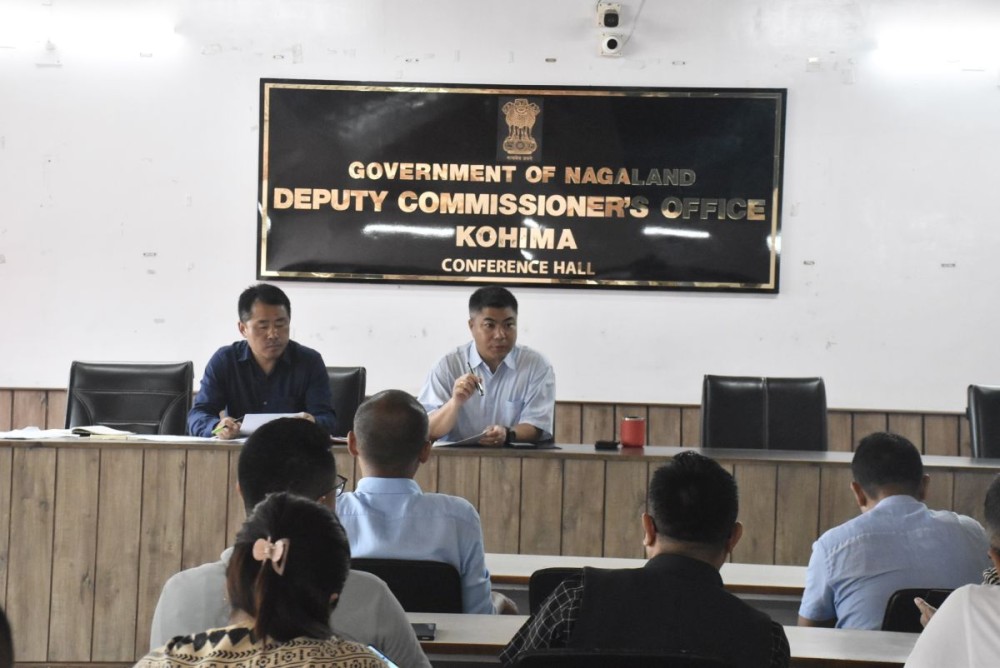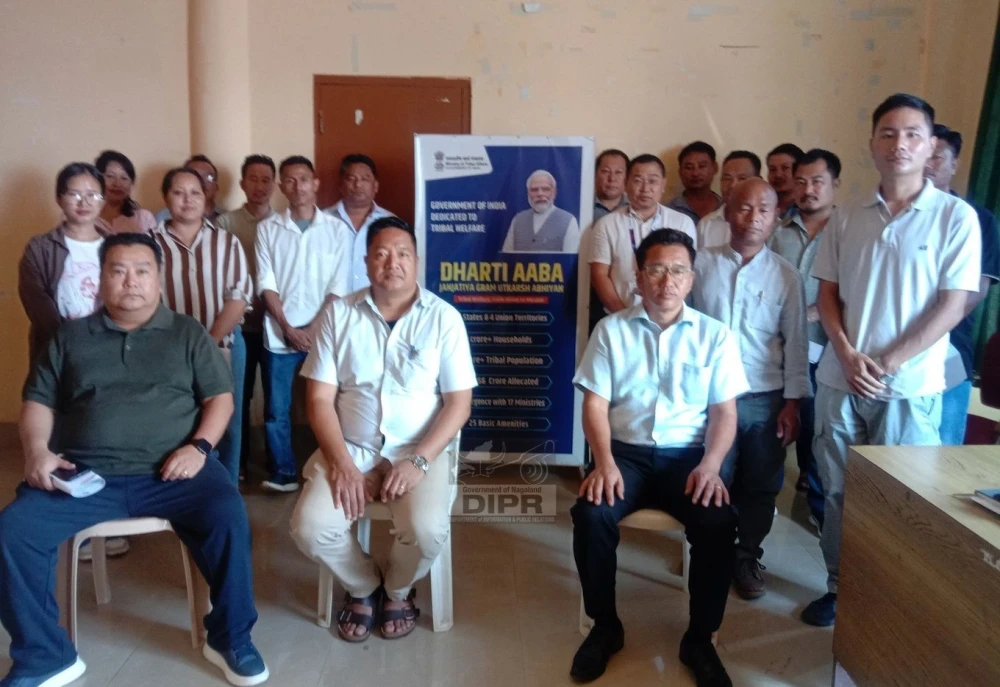A coordination meeting of various stakeholder departments of DAJGUA was convened at the Deputy Commissioner’s Office, Kohima on June 12. (DIPR Photo)

Kohima, June 12 (MExN): The Government of India has launched the Dharti Aaba Janjatiya Gram Utkarsh Abhiyan (DAJGUA), a transformative initiative aimed at fostering inclusive and sustainable development in tribal regions across the country.
Spearheaded by Ministry of Tribal Affairs, DAJGUA seeks to bridge critical gaps in social infrastructure, healthcare, education, and livelihoods through 25 focused interventions coordinated by 17 line ministries. By promoting convergence and enhancing outreach, the initiative strives to ensure the holistic development of tribal communities.
In preparation for the official rollout of the programme scheduled from June 15 to 30, a coordination meeting of various stakeholder departments was convened on June 12 at Deputy Commissioner’s conference hall, Kohima.
According to a DIPR report, the meeting was chaired by Henok Buchem, Deputy Commissioner of Kohima, who welcomed all present and briefed them on a recent video conference held with officials from Delhi and Deputy Commissioners of other states regarding the launch of DAJGUA.
As a key component of the initiative, the Ministry of Tribal Affairs will undertake a nationwide campaign titled “Dharti Aaba Abhiyan – Awareness and Benefit Saturation Camps”. Under this campaign, the Kohima District Administration, in collaboration with various line departments, will organize grassroots-level awareness drives and service delivery camps.
These camps—organised at village and cluster levels—will focus on ensuring the delivery of entitlements and benefits to eligible individuals, while also spreading awareness about the goals of DAJGUA. Some of the services provided will include Aadhaar enrolment, issuance of ration cards, Ayushman Bharat (PM-JAY) health cards, immunization support, and access to financial inclusion schemes such as the Kisan Credit Card and PM-KISAN. In addition, citizens will be able to avail of social security schemes like insurance under PMJJBY and PMSBY, pensions for senior citizens and widows, as well as employment-related benefits under MGNREGA and support for women and child welfare, among others.
A total of 27 villages across the sub-divisions of Chiephobozou, Botsa, Jakhama, Kohima Sadar, and Sechu Zubza have been earmarked for the campaign activities.
The State-level launch of DAJGUA will be held on June 18 at the DC Office Complex, Kohima. All departments have been requested to participate in the event along with their staff. On the launching day, the services of various departments will also be showcased, and community members will be able to directly access and avail these services at the venue.
During the meeting, it was also informed that Rorheu Pesieye, Sub-Divisional Officer (Civil), Kohima Sadar, will serve as the Nodal Officer for the implementation of DAJGUA in Kohima district. Representatives from all stakeholder departments attended the meeting and expressed commitment towards the successful rollout of the initiative.

Longleng: District Level Committee (DLC) convened a meeting at the office conference Hall of the Deputy Commissioner, Longleng, to discuss the implementation of the Dharti Aaba Janjatiya Gram Utkarsh Abhiyan (DAJGUA) and its launching programme was held on June 12, under the chairmanship of Deputy Commissioner Longleng. W Manpai Phom, NCS.
DC highlighted the importance of DA JGUA and called Block wise to assist in spreading awareness and ensuring full community engagement, stated a DIPR report.
The nationwide initiative focuses on the holistic development of tribal areas, aiming to improve social infrastructure, health, education, and livelihood opportunities. The program emphasizes sustainable development through targeted interventions and departmental collaboration.
The campaign seeks to ensure that eligible tribal individuals and families receive essential government services such as Aadhaar cards, ration cards, Ayushman Bharat cards, and other welfare benefits. A major focus is on raising awareness among tribal communities to help them access their rightful entitlements.
The campaign also addresses foundational needs across sectors, aiming to improve service delivery mechanisms. Community involvement remains a priority, encouraging participation from local administration, frontline workers, and stakeholders to enhance the initiative’s effectiveness.
The campaign will adopt a village-level or cluster-based camp approach, ensuring direct outreach to beneficiaries. The initiative further highlights the importance of interdepartmental convergence to streamline efforts.






